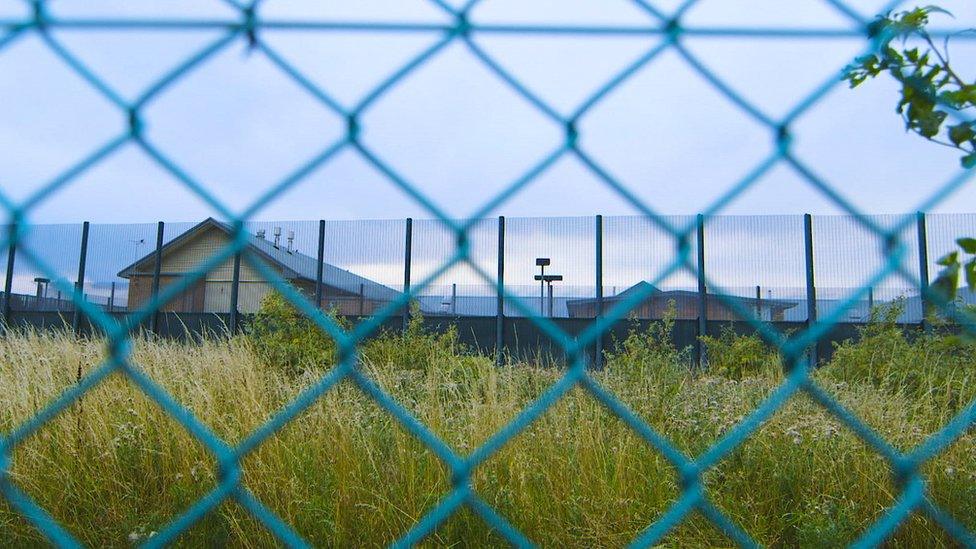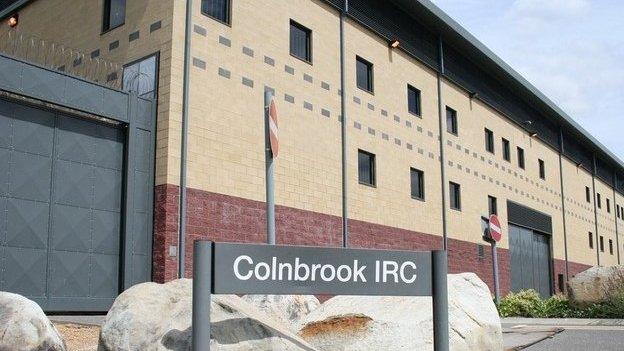Asylum seekers face appeals 'lottery'
- Published

Asylum seekers are facing a "lottery" depending on where their appeal is heard, research by the BBC's Victoria Derbyshire programme has found.
Appeals are twice as likely to be successful at some centres compared with others, data obtained through a Freedom of Information request found.
Shadow attorney general Shami Chakrabarti called for an urgent investigation into the findings.
The Ministry of Justice declined our request for a comment.
One legal supervisor said the situation was so severe that they had heard of cases where lawyers had lied about the address of their client to get their case heard at a different location.
The data concerns 36,000 ordinary asylum appeals from January 2013 to September 2016.
The disparity is illustrated by comparing two busy London centres - at Harmondsworth 24% of appeals were successful while at Taylor House it was 47%.
The figures exclude appeals that concluded as fast-track cases.
Access to good quality legal representation in certain parts of the country and a different "culture" at hearing centres were repeatedly cited as reasons, during the research.
'Legal aid deserts'
Legal supervisor Laura Smith, of Duncan Lewis solicitors, said the statistics were "not surprising at all".
"It's the kind of arbitrary decision-making which I see across the systems all the time," she said, "that two cases with merit can have completely different results, based on different judges and different hearing centres."
Ms Smith said she encouraged her clients to move to the district covered by Taylor House if they were able to do so.
And she even knew of lawyers who lied about their client's address.
Shami Chakrabarti says "legal aid deserts" are failing asylum seekers
Two centres with a very low number of successful appeals, Harmondsworth and Yarl's Wood, were also the tribunals that had heard the highest proportion of cases in which the asylum seeker had no legal representation at all in the same period, a further Freedom of Information request found.
Some 32% of cases heard at Harmondsworth featured unrepresented asylum seekers, 23% at Yarl's Wood.
"There are what has become known as legal-aid deserts," said Catriona Jarvis, a retired judge who sat at tribunals across the country for 12 years.
"It's wholly wrong. It shouldn't be a lottery."
Cuts to government legal aid since 2013 have reduced the financial incentive for immigration lawyers to take on time-consuming asylum appeals.
"These are areas of the country where there are no firms of solicitors who are providing immigration asylum law services," Mrs Jarvis said.
"That becomes incredibly problematic for asylum seekers who have been sent to live in those parts of the country."
Baroness Chakrabarti described the variations as "very upsetting" and said they could not be due to coincidence or weak cases.
She said: "Legal-aid deserts for people in different parts of the country means people are going into asylum appeals unrepresented.
"That's completely unacceptable in a humane democracy."
A spokesman for the judiciary said all judges considered each case individually based on the relevant facts and the law.
The statement said: "First-tier tribunal immigration judges are deployed across the various hearing centres and do not sit solely in any single one, so it is difficult draw any inferences from the available statistics.
"Ultimately, independent judicial decisions are reviewable on appeal if either side is dissatisfied with the outcome."
Watch the Victoria Derbyshire programme on weekdays between 09:00 and 11:00 on BBC Two and the BBC News channel.
- Published18 April 2017
